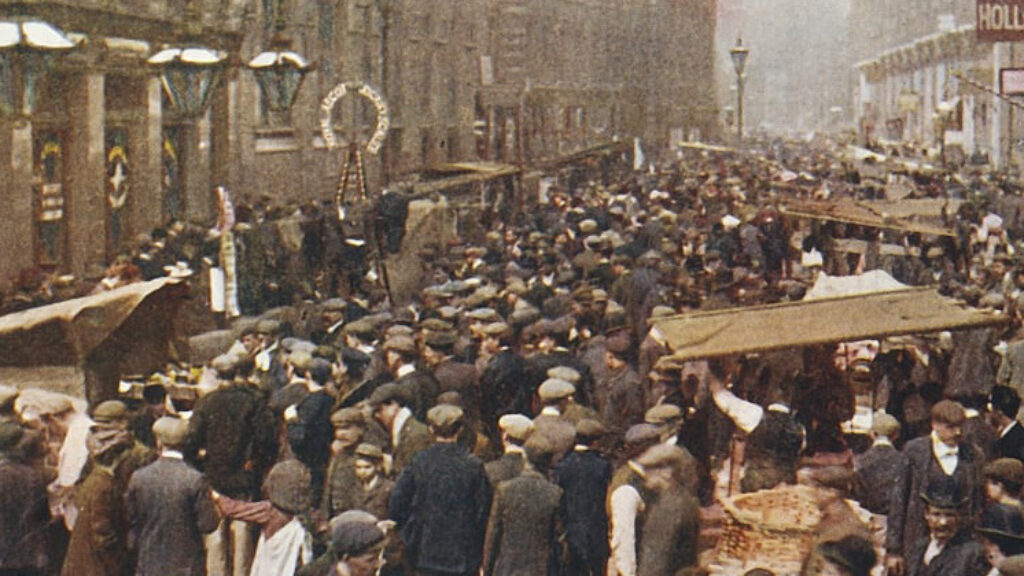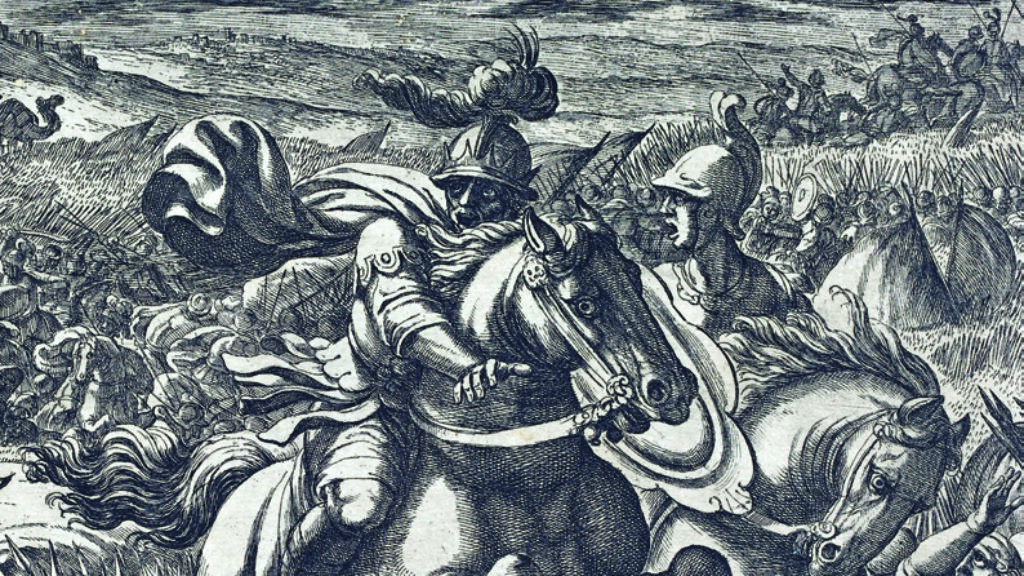The Early Encounters of Jabotinsky
Why return to Vladimir Jabotinsky today? In Hillel Halkin’s Jabotinsky (2014), we witness the transformative experiences of this great man’s youth, which help to explain how he became the formidable Zionist thinker and strategist we know him to be. Three experiences in particular stand out as worthy of attention. First, his encounter with secular European culture, embodied for him in Nietzsche. Second, his shock and revulsion at the plight of the victims of the Kishinev Pogrom—gut reactions which forced him to question his attachment to Europe. Third, his intuition at the Sixth Zionist Congress that a sovereign Jewish state only made sense in Palestine, in Eretz Yisrael, the Jewish homeland—an intuition that led him to vote against the Uganda Plan.
Jabotinsky’s encounter with secular European culture occurred outside the rigid confines of the academy. As someone who believed that knowledge comes more from living life than from listening to university professors or reading books, he spent most of his youth arguing with friends, writing political pamphlets and polemics, and chasing after women. However, there was one author who spoke to him more directly than anyone else: Nietzsche. In Nietzsche, Jabotinsky found someone who shared his desire to extract, through strength of will, knowledge from life. At first, this manifested itself inconsequentially: Jabotinsky and his roommate decided to compete over who could more successfully court the roommate’s girlfriend according to Nietzsche’s advice. Failing to dislodge the girlfriend from the roommate, Jabotinsky decided he could better apply Nietzschean principles of strength and fortitude to political activity than to courtship.
Up until the 1903 Kishinev Pogrom, however, Jabotinsky was unsure of the political cause he would champion. Although he was proud to be a Jew, he had taken it for granted that secular, enlightened Europe would protect his freedom and equality. He had yet to recognize the need for a distinctively Jewish national politics. The Pogrom changed all this. Seeing the helplessness of his brethren in the east, it dawned on him that only by channeling their collective power toward building a state of their own could Jews cease to be the plaything of other peoples. To this end, Jabotinsky knew he needed to get Jews to realize that they had no secure future in Europe. He therefore devoted all his intellectual and creative talents to awakening in them a national consciousness. He wrote a play centered around a scrap of desecrated Torah containing only the verse “I have been a stranger in a strange land”, an image that simultaneously captured the biblical message Jabotinsky hoped would unite Jews across the world, and highlighted the ongoing disintegration of Jewish life in Europe. He put into the mouth of the play’s protagonist the following enunciation of his goal: “So that, once and for all, we’ll burn / Our bridges to this murderous land.” Such a task, Jabotinsky knew, would require many acts of strength and fortitude.
If Jabotinsky understood that Jews had to burn their bridges with Europe, he did not yet know what new land they would settle. It was only his rejection of the Uganda Plan approved at the Sixth Zionist Congress that sealed his commitment to Eretz Yisrael as the future home of the Jewish people. Jabotinsky could never really explain the instinct that made him realize that a Jewish state would only work in the land holy to the Jews. In his later memoirs, he stated that he was moved to vote against the Uganda Plan by the same willful “because” that had previously led him to immerse himself in secular European culture. Jabotinsky had turned his spirit of independence and yearning for greatness away from the pursuit of personal success and towards the pursuit of collective rebirth. This did not mean that his vote wasn’t guided by pragmatic considerations as well. On the contrary, in one of his newspaper dispatches, he noted that the eastern Jews who had opposed the Plan represented the “natural and powerful will of the people” who refused to lose heart and instead said “No matter. Maybe next time we’ll be luckier—and now let’s get on with the work!” Jabotinsky realized that the impoverished and pious eastern Jews could provide the backbone of the future Jewish state, but only if Zionist leaders channeled their longing for Eretz Yisrael towards the actual material settlement of the holy land. He knew that the fervor of the Jewish masses would never be awakened for another land.
With this knowledge, the major contours of Jabotinsky’s Zionist politics fell into place. Moving from strength of will, to strength of will in service of the Jewish people, to strength of will in service of Jewish settlement in Eretz Yisrael, Jabotinsky cemented himself as a dynamic and inspirational Zionist leader. Reading Halkin’s book will kindle in you the same spirit of radical renewal that animated Jabotinsky.
Suggested Reading

The Dichotomy of Modern Culture: A Nietzschean Perspective on Aesthetic Oscillations
BY RACHAEL KOPYLOV Art permeates every aspect of our lives, from visual expression to music and fashion, it shapes and evolves alongside us as it reflects the human experience. The…

My Tutors’ Joy and the Joys of Tutoring: The Power of Non-Traditional Learning Methods
BY YARDENA FRANKLIN Since before I can remember, I have been going to shul with my dad, my very first tutor. Listening to the davening and leyning long before I…

Ashkenazi Migration to London: Building a Jewish Community in the East End
BY EMILY BUNDER When my ancestors left Ukraine during the 1905 Kyiv pogrom, my father’s side fled to Brooklyn, New York and began a life there. However, my mother’s side…

Jewish Resilience in Times of Persecution and Prosperity, From Our Forefathers to the Present
BY JUDAH MARCUS Resilience is a virtue that has been associated with Judaism for countless generations. Throughout Tanakh, there are a great number of stories about our ancestors demonstrating strength…